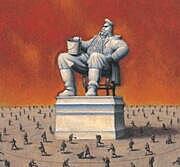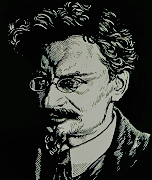|
The Oldest Man posted:I know the discussion is moving on from this point, but there's a new quote from Obama's book that illustrates this point so drat gotta hand it to you, that quote really is like perfectly  holy poo poo holy poo poo
|
|
|
|

|
| # ? May 31, 2024 17:09 |
|
Sharks Eat Bear posted:drat gotta hand it to you, that quote really is like perfectly Yeah I don't want to spend too much time dunking on liberals because, really, what's the point. But to bring it back to Mao, quote:We stand for active ideological struggle because it is the weapon for ensuring unity within the Party and the revolutionary organizations in the interest of our fight. Every Communist and revolutionary should take up this weapon. Liberalism can be evaluated as an ideology like socialism or Marxism can be, but I think something Mao fundamentally got right is that it isn't really the same type of animal. The ideological trappings (negative freedoms, primacy of markets, etc.) are basically just clothing over the top of a way of thinking that whatever preserves the ease of the status quo must be right. That's why liberals are so willing to bend to fascists if the alternative is struggle - because they don't challenge the status quo itself, they just murder certain people living under it.
|
|
|
Guys, it wasn’t neoliberal ideology that prevented us from passing single-payer, it was the fact that the Democratic Party didn’t want to remove the private sector from health insurance! The doublespeak from this moron isn’t even creative at all. His book is a goldmine of hosed up admissions, though; intentional or not.Cpt_Obvious posted:Since there's already been a request for a reading list, I'm gonna add this to the OP. If anyone else has any suggestions, please leave them below or send me a PM or whatever. The Proletariat Revolution and the Renegade Karl Kautsky by Lenin is also a must read IMO. It’s the first book Lenin wrote after the October Revolution, and he addresses the notorious opportunist and shill Karl Kautsky, who at the time was the primary marxist “philosopher” who not only insisted on elections and reforms (lol) to bring the dictatorship of the proletariat instead of revolution (which is impossible, as shown by history), but actively tried to undermine Lenin and the Bolsheviks on behalf of bourgeois states. Lenin also goes into depth on why parliamentary democracy and its institutions are bourgeois scams with his hallmark prose and insight. The Three Sources and Component Parts of Marxism is a short essay he wrote for workers in order to lure them away from the Mensheviks and anarchists, which I’ll just post here: quote:Throughout the civilised world the teachings of Marx evoke the utmost hostility and hatred of all bourgeois science (both official and liberal), which regards Marxism as a kind of “pernicious sect”. And no other attitude is to be expected, for there can be no “impartial” social science in a society based on class struggle. In one way or another, all official and liberal science defends wage-slavery, whereas Marxism has declared relentless war on that slavery. To expect science to be impartial in a wage-slave society is as foolishly naïve as to expect impartiality from manufacturers on the question of whether workers’ wages ought not to be increased by decreasing the profits of capital. So, so good.
|
|
|
|
|
kautsky's great moment of betrayal was in supporting germany's government in the great war and arguing for war funding etc. it's always a horrific thing to reflect upon, but the zimmerwald 'authoritarian' left were the only ones with a sane attitude towards the war. what became the social democratic tendencies of europe proved their loyalties there when push came to shove, like they've consistently done since
|
|
|
|
whenever lenin writes about these people after the outbreak of war there's a strong feeling of very personal betrayal - just from a literary standpoint it's very interesting how he imbues these texts which should be extremely dry with so much emotion and nerve
|
|
|
|
The Oldest Man posted:Yeah I don't want to spend too much time dunking on liberals because, really, what's the point. But to bring it back to Mao, I would say that while this criticism is technically correct, it is not something intrinsic to liberalism. It is a result of liberalism having won its revolutions and becoming the status quo. While all those attitudes are currently correctly associated with liberalism they were found more often among royalists before the liberal revolutions. And after the next revolutions they will be found among Marxists. Even Mao's complains here are complains about maoists who start behaving as centrists in a maoist society which has lots in common to how liberal centrists act in a liberal society.
|
|
|
|
gradenko_2000 posted:I'm not suggesting that online political speech in China isn't heavily regulated, or isn't regulated at all, or that the firewall itself isn't used for that among other things. I've heard that the "firewall" is mostly in place so that the local environment is the default and chinese apps have room to breathe there without being squashed by the western monopolies, how accurate is that?
|
|
|
|
CYBEReris posted:I've heard that the "firewall" is mostly in place so that the local environment is the default and chinese apps have room to breathe there without being squashed by the western monopolies, how accurate is that? That's what I previously wrote, yes - it's very easy to bypass as a private individual, but not as a business, and it acts as what we might call internet protectionism for the PRC.
|
|
|
|
Though given that "it's easy to bypass" doesn't stop the dominant media having a horrific effect on our political ideas, I would still be surprised if it is not a very effective method of social control.
|
|
|
|
OwlFancier posted:Though given that "it's easy to bypass" doesn't stop the dominant media having a horrific effect on our political ideas, I would still be surprised if it is not a very effective method of social control. Yes, but it is more like a garden fence then like the Berlin wall. You are contained because the cops will arrest you if you are to obvious in jumping the wall, not because it directly stops you.
|
|
|
|
Again having seen the damage that more subtle forms of control can do that doesn't really make me feel a lot better.
|
|
|
|
VictualSquid posted:Yes, but it is more like a garden fence then like the Berlin wall. You are contained because the cops will arrest you if you are to obvious in jumping the wall, not because it directly stops you. So, I have a friend from Cuba who is super tech savvy, and he tells a story about his adventures breaking Cuban tech laws. Specifically, he was doing something on the internet that the government didn't like (probably downloading poo poo) and an offical actually showed up to at his door and asked him to stop. He responded with "Yes, sure , will do" and as soon as the guy left he went right back to doing it. It blew my loving mind. If you did something like that in America, you could get hammered with copyright laws and be fined thousands of dollars or even go to jail.
|
|
|
|
VictualSquid posted:I would say that while this criticism is technically correct, it is not something intrinsic to liberalism. It is a result of liberalism having won its revolutions and becoming the status quo. While all those attitudes are currently correctly associated with liberalism they were found more often among royalists before the liberal revolutions. And after the next revolutions they will be found among Marxists. Even Mao's complains here are complains about maoists who start behaving as centrists in a maoist society which has lots in common to how liberal centrists act in a liberal society. I disagree with this. Think about what an ideologically extremist liberal hardliner would look like, and how they would behave, and the degree to which that person is a totally fictional joke character.
|
|
|
|
The Oldest Man posted:I disagree with this. Think about what an ideologically extremist liberal hardliner would look like, and how they would behave, and the degree to which that person is a totally fictional joke character. That is mao's third type of liberalism and to me it is the definition of centrism. Calling that liberalism makes sense only if you have given up on having the word have enough meaning that liberal hardliners can even theoretically exist.
|
|
|
|
VictualSquid posted:Calling that liberalism makes sense only if you have given up on having the word have enough meaning that liberal hardliners can even theoretically exist. I wasn't talking about hardline "status quo" liberals (as Mao would define them) but rather the idea of a hardline ideological liberal as liberals define their own philosophical values and what that person would look like in real life: irrelevant at best, fictional at worst.
|
|
|
|
The Oldest Man posted:I wasn't talking about hardline "status quo" liberals (as Mao would define them) but rather the idea of a hardline ideological liberal as liberals define their own philosophical values and what that person would look like in real life: irrelevant at best, fictional at worst. He would absolutely be irrelevant in the current world, yes. But the hardline ideological liberals ran the french revolution. And if a post-revolutionary society ever sheds the dominant mindshare of liberalism there will be hardline liberals trying to re-establish it, just like there are monarchists under liberal rule.
|
|
|
|
VictualSquid posted:He would absolutely be irrelevant in the current world, yes. But the hardline ideological liberals ran the french revolution. And if a post-revolutionary society ever sheds the dominant mindshare of liberalism there will be hardline liberals trying to re-establish it, just like there are monarchists under liberal rule. I think we're agreeing to a point. In my view the potential of liberalism as a revolutionary ideology (or as an ideology for any type of change in the political economy of society) is permanently dead and although there are and probably always will be liberal maximalists, they're as irrelevant as ideological monarchists are. The people espousing that view today with any audience are doing it for pay as a cover for the defense of the status quo or as a stalking horse to clear the way for fascism. Bottom line, when evaluating or addressing liberal critiques of socialism, it's useless to address them as an ideological critique because that's not their origin or intent.
|
|
|
|
The Oldest Man posted:I think we're agreeing to a point. In my view the potential of liberalism as a revolutionary ideology (or as an ideology for any type of change in the political economy of society) is permanently dead and although there are and probably always will be liberal maximalists, they're as irrelevant as ideological monarchists are. The people espousing that view today with any audience are doing it for pay as a cover for the defense of the status quo or as a stalking horse to clear the way for fascism. Bottom line, when evaluating or addressing liberal critiques of socialism, it's useless to address them as an ideological critique because that's not their origin or intent.
|
|
|
|
The Oldest Man posted:I wasn't talking about hardline "status quo" liberals (as Mao would define them) but rather the idea of a hardline ideological liberal as liberals define their own philosophical values and what that person would look like in real life: irrelevant at best, fictional at worst. These are called libertarians and they are hilarious.
|
|
|
|
or, you know, macron
|
|
|
I like JMP's explaining of Combat Liberalism:quote:Mao's Combat Liberalism is instructive. Despite the fact that some critics have claimed that it has nothing to do with combatting liberalism because at no point in this small article is liberal theory directly discussed, this is disingenuous. While it is indeed the case that Mao does not directly engage with liberal philosophers, the concept of liberalism, or anything that these critics claim they want to see, what each and every example of liberal behaviour castigated in this article demonstrates is that, organizationally, communists must not be liberal subjects. That is, the kind of person that bourgeois ideology socializes people into becoming––through the institutions of family, school, media, work, etc.––is that particular creature that liberalism claims is synonymous with personhood itself: the liberal subject which is the bourgeois subject. The idea that we are isolated individuals whose freedoms necessarily bump against the freedoms of other individuals––that we are essentially self-interested and rational––not only appears in Hobbes' cynical conception of the the state of nature, but in Mill's justification of the harm principle, Kant's categorical imperative, and Rawls' veil of ignorance thought experiment.
|
|
|
|
|
I'm happy Mao's got my back when ruining Christmas this year.
|
|
|
|
Sucrose posted:Is there any form of pro-democracy, explicitly anti-authoritarian Marxism that isn't anarchist? Eh, it depends? I mean, one could certainly mention Democratic Socialism, Anarcho-Syndicalism or maybe even Left Communism, but to a libertarian (and many liberals) Marxism is inherently "authoritarian" no matter the flavor. It depends a lot on your definition of the term and your worldview in general. Is liberal representative democracy real democracy? What expression of power do you believe is legitimate, and when? thotsky fucked around with this message at 15:22 on Dec 11, 2020 |
|
|
|
They could mention them but associating anarchosyndicalism or democratic socialism with marxism is pretty useless unless you use marxism as a catch all term for opposition to capitalism. Left communism grew out of the marxist movement. But plenty of ledt communists are perfectly fine with powerful commanding parties and committies and are more than happy to support terror policies so long as they were the one's in charge and got to pick the victims. There have even been groups like the Bordigists who have declared war on democracy in all of its forms, hoped the Axis won WWII and denounced holocaust remembrance as a liberal anti-fascist plot to obscure the real revolutionary struggle to put them in charge of the planet with absolute power over all the people's of the world. The explicitly anti-authoritarian left communists like Karl Korsch, Otto Rühle and Pannekoek had to realign and open themselves to a lot more socialist ideas and theories and reject large parts of marxist orthodoxy.
|
|
|
|
Baka-nin posted:They could mention them but associating anarchosyndicalism or democratic socialism with marxism is pretty useless unless you use marxism as a catch all term for opposition to capitalism. Could you expand on this? I don't know much about anarchosyndicalism, but I was under the impression that democratic socialism acknowledges Marxist theories such as class struggle and labor theory of value (yes, yes, I know. But if you're pushing labor value these days, you're a Marxist). Obviously, they reject some of its conclusions such as revolution as the only path forwards.
|
|
|
|
Cpt_Obvious posted:Could you expand on this? I don't know much about anarchosyndicalism, but I was under the impression that democratic socialism acknowledges Marxist theories such as class struggle and labor theory of value (yes, yes, I know. But if you're pushing labor value these days, you're a Marxist). Obviously, they reject some of its conclusions such as revolution as the only path forwards. Class struggle as an important component of socialism predates the birth of Karl Marx by quite a lot. Class struggle is not a marxist theory, its a theory that Marx came to accept in his own political development as he moved away from German enlightenment liberalism. He wasn't even the first young hegelian to accept the idea of a society built on struggle between the classes. Marx's theory of value is not universally accepted and many who do accept are not remotely marxist in their own words or framework. Carlo Cafiero was considered by Marx to be the author of the best introduction to Capital he ever read, Cafiero was still expelled from the international with the anarchists and remained a critic of marx other political and economic conclusions. Democratic socialism has a marxist current but its one of dozens of currents and outside of pre WWI Germany it did not become the dominant school of thought. The UK labour party, was dominated by the Fabians, the french socialist party was split amongst multiple thinkers, the majority of the Italian socialist party rejected marxism, the Japanese socialist party was founded by christian socialists etc. The US Socialist party of Eugene Debs was a strange mix of about three or four almost equally powerful tendencies which is a big reason it collapsed under its own weight. The reason why so many marxists in the social democratic and democratic socialist movements left to setup rival Communist parties in the aftermath of the Russian revolution was because they were too marginal to control them. Even in Germany when the split happened the majority stuck with the increasingly non and anti-marxist SPD.
|
|
|
|
Baka-nin posted:The US Socialist party of Eugene Debs was a strange mix of about three or four almost equally powerful tendencies which is a big reason it collapsed under its own weight. Can you expand on this bit? Collapsing under its own weight seems to suggest a problem of size, but I’m not sure why increasing size would be a problem for a political party. As is probably obvious from the question, I know jack poo poo about the US Socialist party.
|
|
|
|
anybody else feel like within online left wing discourse, the term dialectical materialism has devolved into so much misuse to the point of being almost meaningless? i understand yes of course it's a real political term that has real value when applied correctly, please for the love of god do not interpret this post as me saying it doesnt have its place it seems like every time i see it get used online (outside a few specific places) its just devolved into a catch-all buzzword for deflecting literally any and all criticism of anything to do with the ussr/china/etc. by going "welll uhhhh well you see those governments had no choice and had to do what they did because there was no other way because it happened and therefore we have to keep doing the same thing because dialectical materialism" like for fucks sake ive even seen people defending pol loving pot by going "uuuhhhh dialectical materialism you see"
|
|
|
|
actually because im sleep deprived and making bad posting decisions tonight, what are some topics that are almost always guaranteed to cause a shitstorm in any multi-tendency-leftist space online? any sort of left-wing uprisings against the bolsheviks during the russian civil war (makhno, or kronstadt being prime examples) im thinking pol pot being a cia stooge is a big one calling anarchists liberals spanish civil war in general modern china supporting the filipino government fighting maoist insurgents the warsaw pact interventions in hungary, czechoslovakia, or afghanistan literally anything involving deng xiaoping saying the phrase class-reductionism literally any time bringing up us air support for rojava the holodomor i think the most recent example is the chaz, that poo poo causes absolutely unbearable shitflinging Kanine fucked around with this message at 22:22 on Dec 15, 2020 |
|
|
|
Kanine posted:anybody else feel like within online left wing discourse, the term dialectical materialism has devolved into so much misuse to the point of being almost meaningless? Do you want to quote something in specific here for discussion or just complain about Twitter tankies?
|
|
|
|
oh im complaining about leftbook tankies as well
|
|
|
|
Sharks Eat Bear posted:Can you expand on this bit? Collapsing under its own weight seems to suggest a problem of size, but I’m not sure why increasing size would be a problem for a political party. As is probably obvious from the question, I know jack poo poo about the US Socialist party. The SPA was a lot like the French socialists before the First World War in that it didn't have a truly dominant ideological current but several not quite equal but still very powerful groupings, and a lot of dominating personalities. On the one hand this meant the SPA was a lot more open to ideas and tactics that the more uniform socialist/social democratic parties weren't, but it also meant that every change and policy shift pissed off a lot of its members, and after a year or two the balance of power would change so the party would shift its priorities. It was never able to find a balance even under Eugene Debs who managed get along with most of the main partisans of all the factions and even many of the groups outside the SPA. He was on good terms with Emma Goldman and Berkman and remained in contact with the IWW even after the SPA voted to withdraw from it. When it finally started to collapse, its leadership often couldn't agree on anything, the "Left" of the SPA was split in many ways with at least two separate groups calling themselves Communists, one of which tried to convert the SPA and was eventually kicked out, the other abstained. Both formed rival Communist parties until the Bolsheviks got sick of humouring them and pressured them to merge into the CPUSA to give just one example of this dynamic.
|
|
|
Ferrinus posted:
I mean, it does here in China but it’s not how it’s popularly understood. Nobody goes around in terror of the midnight knock on their door but people have internalised rules like “don’t post political views on social media unless you 100% know they are safe to express”, and it’s totally possible to get arrested and none of your family or friends have any idea where you are until you show up on TV to confess to all the crimes that you just found out you committed. gradenko_2000 posted:it's very easy as a private individual to circumvent the firewall - but it's NOT easy to do this if you are a business, China has done a way better job of keeping business and celebrities under government control than any western country. It’s not easy to use a VPN now like it was a few years ago though. China was not totalitarian in the early 2000s but it’s having kind of a conservative backlash now and both government and society in general are definitely getting less tolerant of divergence from norms - there’s a good argument that the current leader is acting as an avatar for the silent majority who were uncomfortable with all these changes: comparisons to Thatcher and Nixon aren’t totally far fetched. #metoo kind of got started here but also fizzled out because the bias against making a public fuss is so strong and the system clamps down hard on public anger that isn’t controlled and channeled by government. Honestly I sometimes wonder if the main conflict in every society isn’t always between the old and the young. The history of human society is the history of growing old, becoming irrelevant and desperately trying to reverse the process. E: Re Combat Liberalism specifically, remember that at the time of writing it Mao’s not a theorist he is a practical man in the middle of a life or death fight who is very focused on the exercise of power. He’s not really writing a critique of liberalism, he’s laying the groundwork to discredit rivals who are also communists, as part of ensuing he has absolute control of the Party. Beefeater1980 fucked around with this message at 10:22 on Dec 13, 2020 |
|
|
|
|
Beefeater1980 posted:#metoo kind of got started here but also fizzled out because the bias against making a public fuss is so strong and the system clamps down hard on public anger that isn’t controlled and channeled by government. There's a rash of that going around these days. 
|
|
|
|
Kanine posted:literally anything involving deng xioping Son of a bitch
|
|
|
|
Beefeater1980 posted:I mean, it does here in China but it’s not how it’s popularly understood. Nobody goes around in terror of the midnight knock on their door but people have internalised rules like “don’t post political views on social media unless you 100% know they are safe to express”, and it’s totally possible to get arrested and none of your family or friends have any idea where you are until you show up on TV to confess to all the crimes that you just found out you committed. You can only get away with that if a plurality of people think it's good that ne'er do wells don't just have free reign to say whatever nonsense on social media, and that having to apologize on camera builds character and sets a good example for the young'uns.
|
|
|
|
Beefeater1980 posted:E: Re Combat Liberalism specifically, remember that at the time of writing it Mao’s not a theorist he is a practical man in the middle of a life or death fight who is very focused on the exercise of power. He’s not really writing a critique of liberalism, he’s laying the groundwork to discredit rivals who are also communists, as part of ensuing he has absolute control of the Party. It's actually Mao in his widely recognized highest theoretical phase, when he was using a lull in combat activity and the weakness of his rivals to take some time to seriously stake out his theoretical line. He had little to do besides read and write for a few years, unlike later when he was either fighting or trying to rule a country. He's been a disfavored rebellious figure in the party for about a decade, and his Soviet-supported rivals had finally hosed up so badly that he got a chance to dig himself out of the hole he had been in. He was nowhere near control of the party, he was the political leader of the military unit in control of the main area still under CCP control, and had recently been accepted back into the core party leadership due to the practical results of his unorthodox methods. He did gain his first major rabid supporters in this period though, like Lin Biao, who IIRC coined the phrase "Mao Zedong Thought". And it's a misrepresentation to claim that Mao wasn't speaking about liberals or liberal attitudes: the communists had been working within the liberal movement under the advice of the Soviet Union, had struggled not to get subsumed in it, and due to Japanese aggression were in talks about fighting as an attachment to the liberal forces again. The communists were recruiting from liberals and ex-liberals, so the party naturally always had a nationalist socdem layer represented by figures like Liu Shaoqi and Deng Xiaoping. Besides, Mao never "ensured" "absolute control". The 1935-1940 phase was when he finally staked out a claim to being a central leader of a revolution, 1949-1962 he struggled to take control of the political direction of the country and fell with the aftermath of the Great Leap Forward, and 1966-1976 he made a comeback to retake control of the political direction. But he did not have a mindset of eliminating (many) political rivals, and the huge oscillations in Chinese policy during the revolutionary decades were due to active struggle between political lines within a heterogenous party.
|
|
|
|
would the heterogeneity of the CPC support the idea that a "one-party state" is still capable of presenting a diversity of tendencies, groups, and policies? I'm specifically referring to this quote from Trotsky: quote:In reality classes are heterogeneous; they are torn by inner antagonisms, and arrive at the solution of common problems no otherwise than through an inner struggle of tendencies, groups, and parties. It is possible, with certain qualifications, to concede that “a party is a part of a class.” But since a class has many “parts”—some look forward and some back—one and the same class may create several parties. For the same reason one party may rest upon parts of different classes. An example of only one party corresponding to one class is not to be found on the whole course of political history—provided, of course, you do not take the police appearance for the reality. In here, he's arguing against the Soviet Union only allowing for one party, because that party represents the workers and the peasants, and any other party would only be used to represent other classes, which would be unnecessary because you want the workers and the peasants to be the ruling class.
|
|
|
|
I have asked this before in another thread I think, but I never found a satisfactory answer (that might be on me). Why is Trotskyism/Trotsky/trots still considered "bad" by many modern, western leftists? Orthodox Marxism, Internationalism, Anti-Stalinism... These things do not seem very controversial among young leftists these days... So why?
|
|
|
|

|
| # ? May 31, 2024 17:09 |
|
Well, whether he wanted to or not, Trotsky ended up making huge contributions to the western anticommunist playbook such that you get avowed "internationalists" explaining that whatever third world country is not socialist, but merely bureaucratically collectivist, and in fact the true revolutionary action would be to support those who oppose both Maduro and Guaido or whatever. How do you define "neocon"? A Trotskyist with a teenaged daughter. That said, I'm not sure to what extent trots are considered "bad" given that Trotskyism is somewhere in the DNA of so much of western leftist thought. I guess out-and-out newspaper selling entryists have a bad rap for being cringey or overly sectarian or whatever, and I think you actually can draw a line between the base assumptions of Trotskyism and its tendency to split and fracture, but just as you say a lot of the actual bedrock assumptions of Trotskyism are baked into generic common sense western communist dogma. Like, as far as I recall Jacobin is basically a trot (or maybe "post-trot" or something) publication, and "Stalinism" still haunts the nightmares of first worlders all across the political spectrum.
|
|
|



























